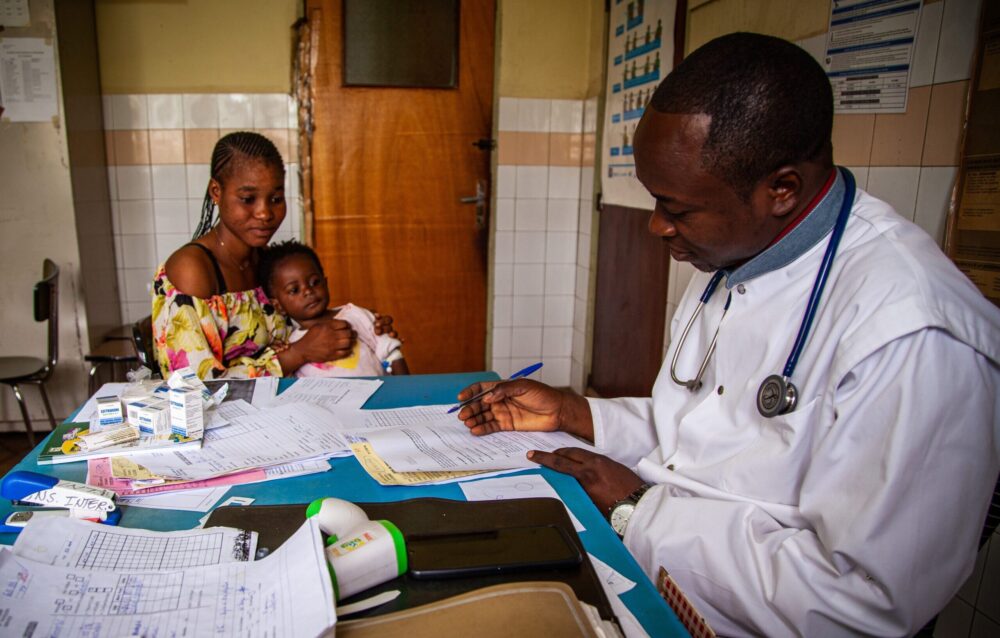September 15th 2022
BRCCH Seminar 20 Oct - Malaria Prevention: Progress and Prospects
**Update Nov 9th, 2022** Thank you to everyone that attended our hybrid seminar! We had a great turnout-- in case you missed the presentations or you would like to watch them again, you can now stream them below or on our YouTube channel.

Visual: Swiss TPH, fairpicture
Description: The BRCCH cordially invites you to join our seminar addressing the progress and prospects of malaria prevention. Prof Simon Draper (University of Oxford, UK) will highlight the challenges, successes and future developments of vaccine-based solutions. Then, Prof Melissa Penny (Swiss TPH) will share her work on data analytics and modelling as product development support. Finally, Prof Evelyn Korkor Ansah (University of Health and Allied Sciences, Ghana) will provide insights into vaccine implementation and equitable distribution.
When: Thursday, October 20th, 2022 from 15:00-16:30 CET
Where: Hybrid Zoom / Kollengienhaus, Hörsaal 116, Petersgraben 50, 4051 Basel
Zoom Registration: HERE
In-person Registration (encouraged but not mandatory): HERE
Schedule:
-
-
- Welcome by Prof Marcel Tanner (Swiss Academy of Arts and Sciences and Swiss TPH)
- Prof Simon Draper (University of Oxford, UK): Malaria Vaccines – Recent Advances and Future Challenges (20 min)
- Prof Melissa Penny (Swiss TPH): Data Analytics and Modelling Supporting Novel Malaria Prevention (20 min)
- Prof Evelyn Korkor Ansah (University of Health and Allied Sciences, Ghana): Lessons from Malaria Vaccine Implementation in Ghana (20 min)
- Q&A and Closing
- Networking Apéro
-
Keynote speakers:

Prof Simon Draper
University of Oxford, UK
Talk: "Malaria Vaccines – Recent Advances and Future Challenges"
Simon Draper is a Professor of Vaccinology and Translational Medicine. The research undertaken in the Draper group focuses on the development of novel and improved approaches to blood-stage malaria vaccine design, as well as aiming to better understand molecular mechanisms of vaccine-induced immunity to blood-stage malaria infection. In particular, the group’s research interests span: strategies for improved vaccine antigen identification; development of improved vaccine delivery strategies; assessment of quantitative antibody correlates of protective immunity, and assessment of human vaccine-induced antibody responses to guide structure-based immunogen design and to better understand protective mechanisms of immunity.
A critical strength of the group is a strong dual focus on preclinical vaccine development in parallel with early-phase clinical vaccine testing and experimental medicine studies. There is a strong translational emphasis, with the most promising new approaches and/or candidate vaccines feeding into the Blood-Stage Malaria Clinical Trials Programme.
Malaria can occur repeatedly even if you have immunity to it. The immune response is also extremely complex; it appears that both antibody- and T-cell-based responses are active and regulate the parasite load in the blood following natural infection.
The development of a vaccine against malaria has proven to be highly difficult, and all current vaccination techniques aim to avoid parasite infection rather than mimic naturally-acquired immunity. Whilst, current vaccine strategies seek to prevent parasite infection – none of these vaccines seek to mimic natural malaria immunity. At this time, there are different types of vaccines at different stages of development. i.e, anti-sporozoite vaccines are in advanced clinical development (Phase 3 or beyond), while blood-stage and transmission-blocking vaccines and monoclonal antibodies are currently in Phase 1/2 trials.
The following are the primary difficulties in creating a malaria vaccine:
- The need to identify antigen targets that are conserved, functionally essential and immunologically susceptible
- Lack of precise methods to correlate immunological responses to malaria with in vivo protection levels
- Need for vaccine delivery technologies that can induce extremely strong immune responses in order to protect, whilst prioritising patient safety
While the following are the additional problems of an evolving vaccination landscape:
- Defining the best deployment strategies for first generation anti-sporozoite interventions
- Assessing and utilizing multi-stage interventions combining vaccines around the parasite’s complex lifecycle
- Achieving long-lasting immunity by vaccination i.e., more than 2 years’ high-level efficacy without the need of annual boosting
- Means to manufacture cost-effective vaccines at scale
We can also assume that multi-stage approaches to combatting malaria could synergize to improve efficacy outcomes. For example:
- Reducing sporozoite burden in mosquito could lead to easier ways to prevent infection
- Reducing sporozoite dose could lead to an easier and more efficient way to clear fewer infected liver cells
- Reducing liver parasitic burden, could make it easier to prevent blood infection
- Reducing blood parasitemia could lead to easier ways to block fewer gametocytes and onward transmission

Prof Melissa Penny
Swiss Tropical and Public Health Institute & University of Basel, Switzerland
Melissa Penny is a professor and Head of the Disease Modelling research unit at Swiss TPH. She has more than 16 years of experience developing mathematical and computational models to provide quantitative evidence to support infectious disease control and elimination decisions, particularly for product development and policy decisions on new interventions.
She leads and has led international multi-institute consortia to provide evidence to WHO and other stakeholders for decision-making on new malaria interventions. This evidence includes the likely public health impact and cost-effectiveness of new interventions, such as the world’s first malaria vaccine RTS,S/AS01 (2015 and 2021), and, more recently, novel immune therapies. Her recent research focuses on developing data- and epidemiology-informed mathematical models and associated algorithms to understand pathogen, host, and intervention dynamics and to inform decisions during product development through implementation and policy recommendations. This work includes new approaches using mechanistic models to inform quantitative target product profiles for novel malaria tools. Her group has also developed new models of SARS-CoV-2 dynamics and applied them to inform decisions on novel interventions against COVID-19. She is also a member of several WHO scientific or technical working groups and WHO Guideline Development Groups.
She also leading a BRCCH-funded project to inform novel medical interventions against SARS-Cov-2 (find out more here).
Over the last 20 years, significant progress has been achieved in combatting malaria. More than 1.7 billion malaria cases have been averted globally, 23 countries are classified as eliminating, 12 of which are certified malaria-free.
However, this progress in burden reduction is now stalling and in some areas, is even reversing. COVID-19 has certainly played a part in this problem, but it is also due to several other factors.
Therefore, we cannot interpret our disease statistics in the same way as we used to before. These factors include:
- Urban malaria requires tailored responses
- Changing patterns of malaria burden and immunity
- Uneven and inequitable access to prevention
- Increasing drug and insecticide resistance
- Invasion of Anopheles stephensi mosquitos into the horn of Africa
Therefore, we cannot interpret our disease statistics in the same way as we used to before. We need to develop and use data-driven analytics and modelling approaches to understand these issues at scale. Modeling and analytics can help in evaluating the efficacy and implementation of new diagnostics, vaccines and therapeutics for malaria as well as tailoring these interventions for use in settings where they are needed most. This exciting field will likely greatly influence the landscape of novel medical interventions for combatting malaria, for example, new drugs, diagnostics, vaccines, and monoclonal antibodies.
This presentation focused on Modelling and Analytics: More specifically how modeling can support development of novel medical interventions, for example optimizing efficacy criteria to achieve greater public health impact, and how modelling can support funding decisions.

Prof Evelyn Korkor Ansah University of Health and Allied Sciences, Ghana
Talk: "Lessons from Malaria Vaccine Implementation in Ghana"
Prof Evelyn Korkor Ansah
University of Health and Allied Sciences, Ghana
Evelyn Korkor Ansah is the Director of the Centre for Malaria Research. She is a Public Health Physician, an Epidemiologist, a fellow of the Ghana College of Physicians and Surgeons and a Rockefeller Foundation Bellagio Fellow. Prof Ansah was the Vice Chair of the Global Fund’s Technical Review Panel (TRP) to combat HIV/AIDS, Tuberculosis and Malaria until 2019. She currently serves on the WHO’s Malaria Policy Advisory Committee (MPAC) and Malaria Elimination Oversight Committee (MEOC). In addition to this, she serves on the Independent Evaluation Panel (IEP) of the Global Fund to fight HIV/AIDS and Malaria. Prior to this, she served on the Technical Evaluation Reference Group (TERG) of the Global Fund, the Bellagio Academic Selection Panel of the Rockefeller Foundation, and the Steering Committee of the ACT Consortium (involving over 15 institutions in several countries).
Her key research interests are malaria case management, diagnostics, health systems, maternal health and capacity building for health research. To this end, she has conducted a number of multi-country and local studies including clinical trials and health systems research.
The WHO Global Technical Strategy for Malaria 2016-2030 sets out a number of key goals including:
- Ensuring universal access to Malaria prevention, diagnosis and treatment
- Accelerating efforts towards elimination and attainment of malaria-free status
- Transforming malaria surveillance into a core intervention
In the last 20 years, remarkable progress in combatting malaria was made: the global case rate reduced by approx. 36%, global mortality rate reduced by approx. 60% while malaria spending increased 300%.
However, in the last couple of years, progress has started to stall and current analyses show that 78 out of 88 malaria endemic countries providing data for 2010-2020 have detected resistance to at least one insecticide. Over 30% of endemic countries have detected resistance to pyrethroids and three others classes of insecticides. Currently, African countries account for 95% of malaria cases worldwide and we are currently off-track by 40% (cases) and 42% (mortality).
These staggering statistics confirm that there is certainly a need for new tools, and an even a greater need to strengthen the implementation of existing tools.
The pilot implementation of the vaccine revealed challenges related to caregivers, communities and the health system. These challenges give us an insight into some of the implementation challenges the earlier preventive tools have faced and continue to face. There is therefore a need to pay attention to these challenges as we strive to maximize the impact of existing tools/strategies and introduce new ones.
One of the main challenges in the affected communities is the normalization of malaria in endemic countries where a sense of ‘’We live with it’’ is widely spread and accepted. The perception of risk from this disease is low and it is a real issue. Additionally, vaccine hesitancy due to social media-based information, rumors and beliefs, limited health system capacity, supply chain challenges, inadequate community engagement, and limited healthcare worker training including in leadership are also current issues that are being faced locally.
Most importantly, we must pay attention to the social determinants of malaria burden. We need to make sure that the interventions we put in place are going to achieve maximum impact in the community. This can only happen if community members are engaged in finding and implementing the solution to the problem of malaria in their locality. While people should not be left behind in benefiting from interventions, they need to be part of and contribute to the fight against malaria as well.
These seminars were recorded on October 20th, 2022 in Basel, Switzerland.
Downloads